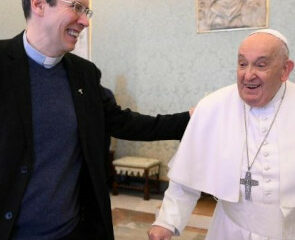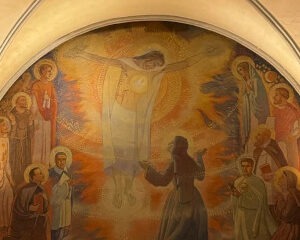 “You will receive power when the Holy Spirit comes upon you. You will be my witnesses in Jerusalem, in all Judea and Samaria, and to the ends of the earth (Acts 1:8). These are the last instructions that the risen Jesus gives to the Apostles and those who were with them, to Mary, to the women, after they have shared their lives for forty days. On the day of Pentecost, they are invested with the Spirit. They are baptised in the Spirit. The effect is immediate: they come out of the upper room and speak to the crowds of the one they witness, the dead and risen Jesus, the Saviour of the world. The synod “Walking together in fellowship on the same road” brings to life this mission of the disciples of Jesus.
“You will receive power when the Holy Spirit comes upon you. You will be my witnesses in Jerusalem, in all Judea and Samaria, and to the ends of the earth (Acts 1:8). These are the last instructions that the risen Jesus gives to the Apostles and those who were with them, to Mary, to the women, after they have shared their lives for forty days. On the day of Pentecost, they are invested with the Spirit. They are baptised in the Spirit. The effect is immediate: they come out of the upper room and speak to the crowds of the one they witness, the dead and risen Jesus, the Saviour of the world. The synod “Walking together in fellowship on the same road” brings to life this mission of the disciples of Jesus.
The first Christian communities on mission
From the beginning, the apostles lived in communion with small communities, the “households”. Each of them participates in the mission, in the proclamation of the Good News of Jesus who died, was crucified and rose again. Under the action of the Spirit, the whole community prays, discusses, convenes and acts. All the people give thanks for the lame man at the Beautiful Gate (3,9). The Twelve do not decide alone. Filled with the Holy Spirit, the community begins to pray (4,29-32). The multitude of believers is perfectly united in heart, soul and goods.
A common discernment
The assembly, together with the apostles, chooses seven men full of the Holy Spirit and wisdom to take care of the widows and to serve at the tables (6,1-7). A Gentile centurion, Cornelius, takes the initiative for Peter to go to his house (10:7). The community of Antioch sends Paul and Barnabas on a mission (13,3).
Discussions about circumcision and the rites to be performed (15,2) lead to the assembly in Jerusalem: the Holy Spirit, “the apostles and the elders with the whole church decided…” “The brethren” send Paul and Silas to Berea (17,10). Priscilla and Aquila, a couple of weavers, complete the catechesis of Apollos who had not heard of the Holy Spirit (18,24-28). The people of the community of Pozzuoli, in Italy, are hospitable; for a week they receive Paul and his companions.
The mission is lived with joy in spite of trials, conflicts, hostilities and persecutions.
Our Church in mission today
“The Church “on the move” is the community of missionary disciples who take the initiative, who get involved, who accompany, who bear fruit and who celebrate. The evangelising community experiences that the Lord has taken the initiative, has preceded it in love (1 Jn 4,10), and therefore knows how to go forward, knows how to take the initiative without fear, to go out to meet the people, to seek those who are far away and to go to the crossroads to invite the excluded…. It lives an inexhaustible desire to offer mercy. Let us dare, a little more, to take the initiative! Consequently, the Church knows how to “get involved”…
At the heart of the world
The evangelising community, by its works and gestures, places itself in the daily life of others, shortens distances, stoops down to the point of humiliation if necessary and takes on human life, touching the suffering flesh of Christ in people…
The Lord wants it to be fruitful. He takes care of the grain and does not lose peace because of the chaff. The sower, when he sees the tares appear among the grain, does not react with complaint or alarm…. He celebrates and rejoices every small victory, every step forward in evangelisation…
The Church evangelises and evangelises herself through the beauty of the liturgy, which is also a celebration of evangelising activity and a source of renewed impetus to give of herself (The Joy of the Gospel 24).
The synthesis of the bishops of France in Lyon
The assembly of bishops wants to be faithful to the calls of the Holy Spirit. “At all levels, ecclesial communities must be built up on the basis of the charisms of each person; this enables each baptised person to exercise the responsibility that is his or her due and to participate in the mission in society and in the Church.
Co-responsibility derives from the fact that the mission is entrusted to all the baptised: clergy and laity, men and women, young and old. It is necessary to start afresh, not exclusively from the office entrusted, but from the baptismal ministry of each and every one. Clericalism is a scourge for which clergy and laity have a joint responsibility. But the conciliar generation that is still mobilised is in the minority, while the generation of young Catholics is not passionate about the synod.
At SVECJ
Our Society of the Evangelical Life of the Heart of Jesus, in the diversity of our vocations, contributes to this impulse to walk together, to discover what is the mission of the People of God today. ” The path of synodality is the path that God expects of the Church, of the whole people of God and of each individual.
![]() Découvrir le Projet de Vie de la SVECJ
Découvrir le Projet de Vie de la SVECJ
In the heart of Jesus
Let us go deep into and with the Heart of Jesus. Let us go out into the open sea, let us go into deep waters. Our vocation is communion with the Heart of Christ who sends us to build the Church of the Beatitudes with the poor, the little ones, the humble, the sinners and with all those who are open to love (Life Project 12) – in the school of Father de Clorivière in times of persecution and of Daniel Fontaine in the heart of the slums.
“Members of the Church, the Body of Christ, we are concerned to build communion in a critical and inventive fraternity. The very diversity of our vocations should stimulate each of us to discover and live God’s plan for us…. Fraternal life calls us to open our relationships without boundaries (Plan of Life 54-56)”.
Our mission as a member of the SVECJ
The mission of our Society of Evangelical Life is to make known the Heart, the love of God revealed in Jesus, to all people, to all nations. The diversity of our vocations should stimulate each person to discover and live God’s plan for him or her (55). The organisation of the Church has no other aim than to translate and communicate the love of Jesus, the Saviour of the world. Our Institute seeks to follow Jesus as closely as possible.
Living synodality more fully
In this deepening of synodality, Christ is our permanent reference point. What does Jesus think of our syntheses? What would Jesus say? What would Jesus do? The mission of the people of God is to proclaim Jesus dead and risen, baptising, immersing the nations in Trinitarian Love: God our merciful Father, the Spirit of Love our Mother, Jesus our Brother.
Participation, communion and mission
If there is participation, communion and mission, it is par excellence at the heart of the Trinity-Love. The Church is at the service of the Most Holy and Merciful Trinity. She must be a revelation of the Trinity’s communion of love: God is Love: paternal love, maternal love, filial and fraternal love. The mission of the People of God will remain until the end of time: “Make disciples of all nations, baptise them in the name of the Father and of the Son and of the Holy Spirit…. Teach them to keep my commandments of love. Teach them to keep my commandments of love. Every day I am with you, every day all nations!
François Tricard, SVECJ
Priest of the diocese of Sens-Auxerre
Rector emeritus of the Catholic University ofLyons






